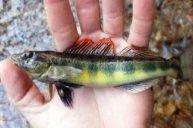Several species of fish have been found to have a build up of human antidepressants.
A new study in the Niagara River has shown that 10 different species of fish have high concentrations or remnants of the metabolized drug in their brains.
This medical buildup raises some serious environmental alarms. The Niagara River connects Lake Erie and Lake Ontario.
Phys.org reported lead scientist Diana Aga, PhD, as saying, "These active ingredients from antidepressants, which are coming out from wastewater treatment plants, are accumulating in fish brains. It is a threat to biodiversity, and we should be very concerned." Dr Aga is the Professor of Chemistry at the Buffalo College of Arts and Sciences.
Consequently, the antidepressants could affect the fish behavior in the river. With the drugs in their system a fish might not acknowledge predators as much. Antidepressants can affect the feeding behavior; in turn making fishing harder.
Although this particular study did not look into fish behavior others have demonstrated the impacts. The level of antidepressants in the fish is not dangerous for human consumption.
The problem is most likely a result of more people taking antidepressants. Wastewater facilities have not kept up the filtering process for these drugs. As a result the drugs end up being dumped back into the environment. The drugs were found in smallmouth bass, largemouth bass, rudd, rock bass, white bass, white perch, walleye, bowfin, steelhead, and yellow perch. With rock bass having the highest levels.
Therefore, some are stating that the wastewater treatment systems need to change. Starting to look for these and treat for pharmaceuticals. However, while I agree with this, I propose a solution that treats the source. Seems like people need to fish more and stress less.
NEXT: THIS IS WHY YOU NEED TO ADD STING KILL TO YOUR PACK
WATCH




